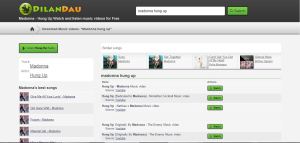On October 10, username “davidclowery” (which, I’ll assume, is actually David Lowery) posted an article on the Trichordist called Is Google still serving ads on illegal sites? Lowery’s intent was obviously to slander Google, again, as a “piracy machine.” Instead, he inadvertently showed yet another example of widespread DMCA abuse by copyright holders.
In the article, Lowery posts some screen shots (of his phone’s browser…) showing the source code of the dilandau.eu home page. The source code shows some tags that have “adsbygoogle” in them. This, claims Lowery, shows that Google is “still” serving ads to sites that are “well known for infringing content.”
The problem is that dilandau.eu does not provide infringing content.
This may seem ludicrous. After all, if you visit the site, it certainly looks like a “pirate site.” There are offers to download music; the word “free” is everywhere; Top 40 songs are featured prominently. But all of this, as it turns out, is simply false advertising.
If Lowery had actually bothered to click on any of the links, then he would not have been taken to a page to download any pirated songs. Instead, he would have been taken to a page with embedded YouTube videos of the songs in question. Most of the YouTube videos embedded on the Dilandau site are from official channels like Vevo. (Even if not, the fact that they are on YouTube suggests they are licensed through Content ID.) There is no obvious way to download an MP3 version of the song through the website.
I confirmed this myself. Right after the Trichordist story came up on in my feed reader, I went to the website and did a search for “madonna hung up”. (This is the song where Madonna samples ABBA, with permission, in the least creative way possible.) Here is a screenshot of the result:
Note the sources. All are from YouTube. Not a single one is from any pirate site.
But Lowery is right about one thing. Google does receive a huge amount of DMCA takedown requests specifically targeted to dilandau.eu. According to Google’s transparency report, over the past year, Google received DMCA requests for 7,208,995 pages on Dilandau’s domain, and there were over 11 million requests since 2011. (That number is less that 5% of Dilandau’s total indexed pages, however.) The BPI (the British version of the RIAA) sent the vast majority of them, with the RIAA coming in a distant second. DMCA takedown notices on the site continue to this day.
And that’s a problem. If the URL’s are anything like the Madonna page, above, then these are invalid DMCA claims. They are requests to take down material that is not infringing; material that is, in fact, authorized. Is that the case?
Armed with this knowledge, I went to Chilling Effects and did a search for “dilandau.eu”. Results were returned by date, newest first. I copied-and-pasted every single URL from the first page of results that were returned. Not a single page provided any material other than an embedded YouTube video. In fact, most did not provide any material at all, but were search queries rewritten as URL’s.
This, by itself, is not definitive. The latest DMCA request on Chilling Effects was from September 25th. It’s entirely possible that Dilandau started displaying YouTube videos only for the past couple of weeks, and they actually were offering infringing content before then. (I wouldn’t know; I hadn’t heard of the site before.) But it takes time for a DMCA request to show up on Chilling Effects. The page dedicated to dilandau.eu from Google’s transparency report shows that, as of right now, copyright notices are still being submitted for URL’s on that website.
Despite the fact that there is no pirated material on the site, Google honored every single takedown request. I am not blaming Google for this; they simply don’t have the resources to examine all the DMCA requests that they receive. That is not their job; it is the job of the copyright holders to make sure the requests are valid.
But it does show exactly how meaningless the “98% removed” metric is. Simply because Google complied with a request, does not make it “valid.” It also shows just how hard it is to determine what is and isn’t a “pirate site,” or a site that is “dedicated to infringing content,” or whatever the term is that copyright lawyers are using this week.
And it shows exactly why the DMCA needs to be revised: to make it harder for rights holders to abuse.

This blog is good reading, Karl. Keep it up and thanks.
LikeLike
Good to see you back, Karl. Interesting post. Do you know if this is a widespread problem? On chillingeffects.org (thank you for the link), I saw some take-down notices sent to other front end sites for legal music, but I don’t know the licensing status of the tracks involved.
LikeLike
Thanks for the reply.
I don’t have any more insight into the licensing deals for third-party websites, so I don’t know the licensing status of the tracks involved, either.
But in general, invalid DMCA takedown notices are a problem that has been fairly well documented. A study from 2006 found that over half of the notices sent to Chilling Effects were invalid:
Click to access Urban-Quilter-512-summary.pdf
That was a while ago, and I imagine the number of invalid DMCA notices has only increased, due to the fact that they’re largely automated nowadays.
LikeLiked by 1 person
Thank you for your reply, Karl. Your comment, like your blog, shows that you are a skilled researcher and an informed writer. Your blog is on my A List.
LikeLike